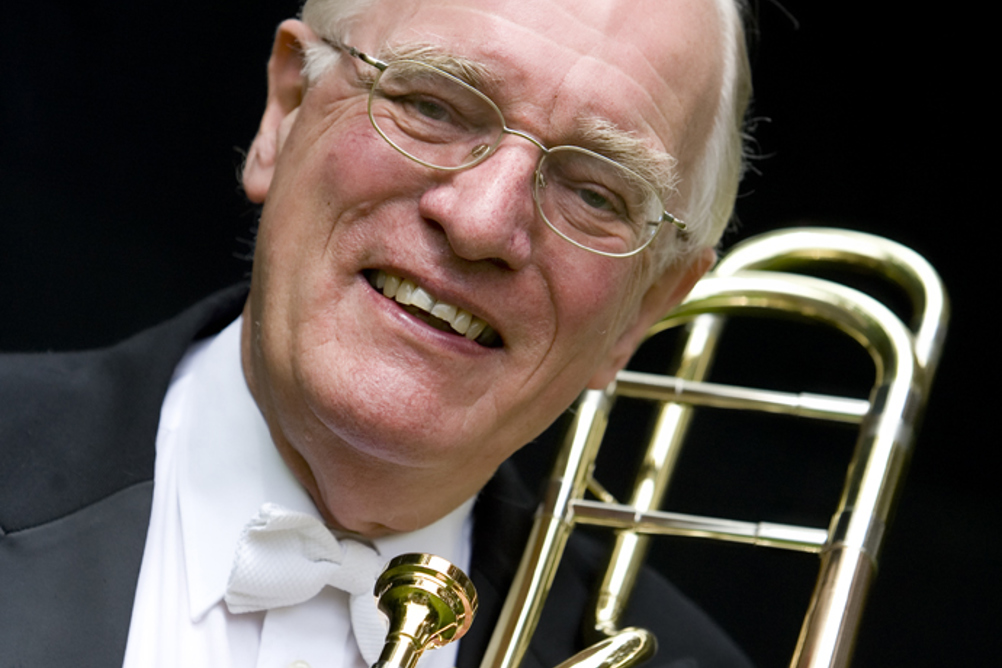
A cross the music world, Denis Wick is a household name. Most brass players will own at least one mute or a mouthpiece bearing his name. But people may be less familiar with the man behind the brand, one who exuded enthusiasm, had mastered the trombone, and shaped and guided musicians for many generations.
For over 30 years, Denis was principal trombone of the London Symphony Orchestra. He famously brought a Conn 8H back from Brussels in the late 1950s, and was instrumental in establishing the tradition of modern trombone players performing on large-bore trombones, changing the entire sound of the orchestral brass section. This can be heard on many of his seminal recordings with the LSO: the first Star Wars film, Shostakovich Symphony No. 5 from 1966 with André Previn – there are many out there.
Setting up shop
His decision to leave the LSO in 1988 was both brave and, by his own admission, one of pure vanity: he didn't want to be remembered as some old codger who could just about play the trombone, so thought he would quit while he was ahead. The selfless dedication required to play at such a high standard was instead dedicated to his recent mouthpiece business – these new, large-bore trombones were, after all, in need of something quite different to their small–bore predecessors. The business flourished, and it turned out Denis was perhaps an even better businessman than musician.
Denis the teacher
Thankfully, Denis continued to teach, guiding many great players such as Peter Gane, Dudley Bright and Helen Vollam, and during my own student days I was fortunate to spend a year studying with him. What I didn't know at the time was how fundamentally important these lessons would be to my entire career as both a player and a teacher. He showed me how to work on my sound in Mahler 3 using one of his practice mutes. He would then dive into a 20-minute story about the LSO, back in the 70s when the brass section were absolute world-beaters, about the way they played a particular piece, or interacted with a famous conductor – Denis was a wonderful raconteur, with a deep, rich voice. It was told with such colour and enthusiasm, you wanted nothing more than to succeed as a professional trombone player. On the train home I would make notes from the lesson and realise that during this story he had perfectly described the sound and style of what I had been trying to do on the instrument an hour earlier. And this was one of his great gifts – slipping bits of information into stories which only later you would realise were absolutely integral to your development.
Another of his strengths as a teacher was the confidence he would instil in you. His tireless energy and enthusiasm were infectious. If preparing you for an audition, he would make you feel invincible, like there was no possible way the audition would be anything other than a success. And that confidence would somehow transmit into your breathing and then the airstream, and suddenly you realised that playing the trombone in an orchestra was, for Denis, as natural as breathing and talking. And if you could copy just some of those mannerisms, maybe you stood a chance of becoming a professional trombone player.
The trombone section of the Gustav Mahler Jugendorchester were fortunate to be tutored by him. These sessions were highly insightful and gave a glimpse of just how good a principal trombone Denis was in his heyday. It was not just about playing the notes; it was the way the first trombone led, the way they set the tone and style for the section. We would play endless Bach chorales, hear yet more anecdotes, all delivered with boundless enthusiasm and unwavering encouragement. Eventually we would get around to playing the actual music for the course. By that point he had finely tuned us into a wonderful orchestral trombone section, meaning everything was prepared swiftly and efficiently in the very final sectional.
I think it is fair to say that Denis is the father of modern British trombone playing – his name is up there with other pedagogical greats such as Arnold Jacobs, and, like them, he inspired generations of musicians. But his influence reached far beyond the brass community, as he also found the time to conduct the Essex Youth Orchestra, sharing with them his enthusiasm for music, his great sense of humour and his unique ability to bring the best out of people.




